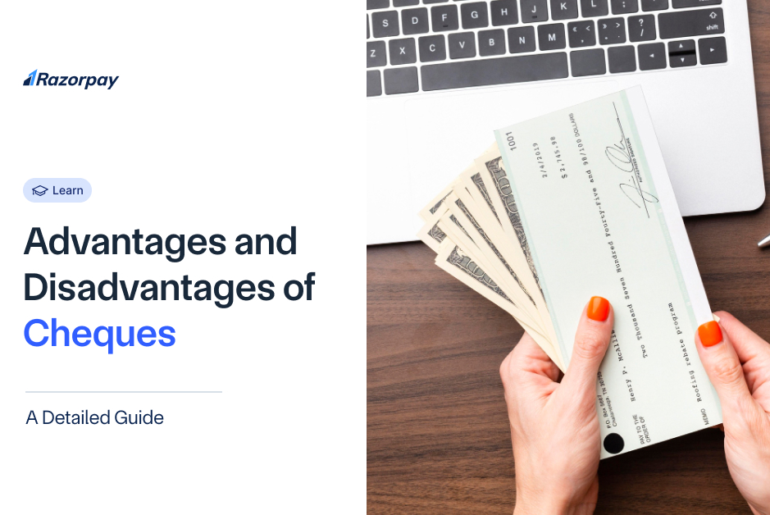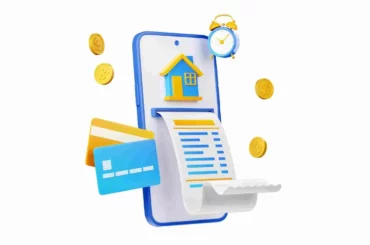Although electronic payments have surged in popularity, the traditional cheque remains a trusted method for many individuals and businesses. This guide explores the advantages and disadvantages of cheques, offering insights to help you determine when this classic payment option is the best fit for your needs.
Table of Contents
Advantages of Cheques
Cheques offer several benefits that make them a viable choice in certain situations.
Let’s dive into the key advantages of using cheques:
1. Enhanced Security & Prevention of Unauthorized Transactions
- The primary advantages of cheques is the level of security they provide. Unlike cash, which can be easily lost or stolen, cheques offer a more secure way to make payments. If a cheque is lost or stolen, you can quickly contact your bank to stop payment, preventing unauthorized transactions.
- Cheques provide a paper trail, making it easier to track and verify payments. This can be particularly useful in business settings, where maintaining accurate financial records is crucial.
2. Comprehensive Record-Keeping for Easy Tracking
- Cheques offer a convenient way to document your financial transactions. When you write a cheque, you create a physical record that includes the date, the amount, and the payee’s name. This information can be invaluable when it comes to budgeting, tracking expenses, or resolving any payment disputes that may arise.
- Banks provide cheque books that include carbon copies or stubs, allowing you to keep a personal record of your payments. This feature can help you stay organized and maintain a clear overview of your spending.
3.Cost-Effective with No Additional Transaction Fees
- Cheques typically don’t incur transaction fees. This can be a significant advantage, especially for larger payments or for businesses looking to minimize their expenses.
- Banks may charge fees for certain cheque-related services, such as ordering cheque books or processing a stopped cheque. Review your bank’s fee schedule to understand any potential costs associated with using cheques.
4. Broad Acceptance Across Various Payment Scenarios
- Many individuals and businesses still prefer or require payments by cheque. This is particularly true for larger transactions, such as rent payments or business-to-business invoices.
- Cheques may be the only accepted form of payment when dealing with smaller businesses or individuals who may not have access to digital payment infrastructure. Having a cheque book on hand, you can ensure that you’re prepared to make payments in a variety of situations.
5. Personalization Options for a Unique Touch
- Cheques offer a level of personalisation that digital payments often lack. When you write a cheque, you have the opportunity to include a personal note or message to the recipient. This can be especially meaningful for gifts or charitable donations, allowing you to express your sentiments along with your financial contribution.
- Additionally, many banks offer the option to customize your cheque books with personal designs or images, adding a unique touch to your payments.
6. Well-Suited for High-Value Transactions
- Cheques are often the preferred method of payment for larger transactions, such as down payments on a home or car, or for business purchases. This is because cheques provide a secure and reliable way to transfer significant sums of money without the need for cash or the potential risks associated with electronic transfers.
- Cheques can be used for transactions that exceed the daily limits imposed by some digital payment platforms, making them a convenient choice for high-value payments.
Disadvantages of Paying with Cheques
While cheques offer several advantages, they also come with certain drawbacks. Let’s explore some of the potential disadvantages of using cheques:
1. Processing Time
- One of the most significant disadvantages of cheques is the processing time involved. When you pay by cheque, the funds are not immediately transferred from your account to the recipient’s. Instead, the cheque must be deposited and cleared by the bank, which can take several business days.
- This delay can be inconvenient for both the payer and the payee, particularly in situations where quick access to funds is necessary. In contrast, electronic payments typically offer much faster processing times, with funds often available within minutes or hours.
2. Risk of Bouncing
- Another potential drawback of cheques is the risk of cheque bouncing. If you write a cheque without sufficient funds in your account to cover the payment, the cheque will bounce. This can result in significant fees from both your bank and the recipient’s bank, as well as potential damage to your credit score and reputation.
- It’s crucial to keep accurate records of your account balance and ensure that you have sufficient funds available before writing a cheque.
3. Physical Security
- While cheques offer a level of security in terms of tracking and stopping payments, they also come with certain physical security risks. Cheques contain sensitive information, such as your name, address, and account number, which can be used for fraudulent purposes if they fall into the wrong hands.
- It’s essential to store your cheque books in a secure location and to be cautious when providing cheque information to others. If you suspect that a cheque has been lost or stolen, contact your bank immediately to stop payment and prevent unauthorized transactions.
4. Inconvenience
- In today’s fast-paced digital world, using cheques can sometimes be seen as inconvenient. Writing out a cheque, delivering it to the recipient, and waiting for it to clear can be time-consuming compared to the instant nature of digital payments.
- Many businesses and individuals have moved away from accepting cheques altogether, preferring the speed and efficiency of electronic payment methods. This can limit the situations in which you can use cheques and may require you to seek out alternative payment options.
5. Limited Use
- The acceptance of cheques has declined in recent years, with many businesses and individuals opting for digital payment methods instead. This limited use can be a disadvantage for those who prefer or rely on cheques as their primary payment method.
- You may find that cheques are no longer accepted for certain transactions, such as online purchases or bill payments. This can be frustrating and may require you to adapt to new payment methods or seek out alternatives that still accept cheques.
6. Security Concerns in Paying with Cheques
- Cheques offer some security features, they also come with certain risks. As mentioned earlier, cheques contain sensitive information that can be used for fraudulent purposes if they fall into the wrong hands. This includes the risk of cheque fraud, where criminals may attempt to alter or forge cheques to steal funds from your account.
- It’s important to take precautions such as storing your cheque books securely, monitoring your account activity regularly, and being cautious when providing cheque information to others. If you notice any suspicious activity or unauthorized transactions, contact your bank immediately to report the issue and stop further fraud.
7. Cheques in the Digital Age
- As digital payment methods continue to evolve and gain popularity, the role of cheques in the modern financial landscape is changing. Many businesses and individuals are moving away from cheques in favor of faster, more convenient electronic payment options.
- In certain situations, such as large transactions or dealings with individuals or businesses that prefer cheques, they can still be a valuable payment method. The key is to understand the pros and cons of cheques and to use them in situations where they are most appropriate and effective.
Digital Alternatives to Cheques
1. UPI
Unified Payments Interface (UPI) is a real-time payment system developed by the National Payments Corporation of India. UPI allows users to transfer funds between bank accounts instantly using a mobile app.
Key benefits of UPI include:
- Instant transfers
- 24/7 availability
- No need to share sensitive bank information
- Secure transactions with two-factor authentication
UPI has gained widespread popularity in India, with millions of transactions processed daily.
2. Net banking
Net banking, also known as online banking, allows users to manage their bank accounts and make payments through a secure website.
With net banking, you can:
- Transfer funds to other accounts
- Pay bills and invoices
- Set up recurring payments
- View account statements and transaction history
- Net banking offers the convenience of making payments from anywhere with an internet connection, eliminating the need for physical cheques.
3. Credit / debit cards
Credit and debit cards are widely accepted payment methods that offer several advantages over cheques:
- Instant payment processing
- Secure transactions with chip technology and PIN protection
- Rewards programs and cash back offers
- Dispute resolution services for fraudulent transactions
Credit and debit cards are particularly useful for online purchases and in-person transactions where cheques are not accepted.
Related Read: What Is an Account Payee Cheque?
Frequently Asked Questions
1. How does one pay with a cheque?
To pay by cheque, fill in the payee’s name, amount, and date, then sign it. The payee deposits it to receive payment.
2. Is it safe to pay by cheque?
Cheques offer security features like stop payments, but there’s some risk of fraud. Keep your cheque book secure and monitor your account.
3. What are the risks of using cheques?
Risks include bounced cheques, fraud, and lost or stolen cheques. Ensure funds are available, secure your cheque book, and be cautious with cheque information.
4. Is it advisable for business transactions?
Cheques can be useful for larger business transactions but may be slower than electronic methods, which offer faster processing.
5. Why are cheques declining in use?
Cheques are declining due to faster, more convenient digital payments, though they’re still relevant in some cases.



